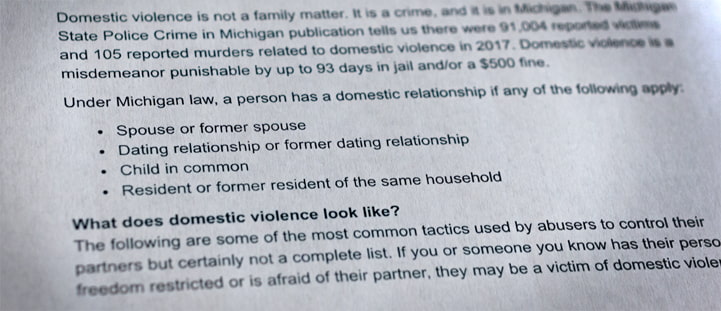






-

-
-
Maggie GeorgeRated by Super Lawyers
loading ...
Domestic Assault and Spousal Abuse
In Michigan, domestic violence charges carry serious legal consequences and can seriously damage someone’s reputation even if the accused person is innocent. In today’s society, accusers are actively encouraged to come forward and press charges. Obviously reporting abuse is important; however, it’s equally important that both sides of the story are accurately heard by both the courts and the public.
Since domestic violence carries harsh penalties and social consequences, it’s important to have an experienced domestic violence lawyer represent your interests when being charged with this offense.
The criminal defense team at George Law is highly experienced in domestic violence cases. If you’re being charged with domestic assault or another related offense, contact our lawyers for a free consultation today.
Michigan Domestic Violence Laws

Domestic violence in Michigan is defined as occurring between spouses, former spouses, past and present dating partners, individuals with a child in common, and present and former household residents. These situations often start with a simple disagreement between the parties. However when it escalates to physical violence – such as when a party allegedly assaults or batters the other individual – domestic violence may have occurred.
There are various types of domestic violence defined in Michigan, with the main ones being domestic assult, aggravated domestic assult, sexual assault and stalking/harrassment. Under Michigan’s domestic violence laws, these charges can be considered either misdemeanors or felonies depending on the circumstances, including the severity of physical injury as well as whether or not it’s the first offense.
Self-Defense In Michigan Domestic Violence Situations
Being involved in a domestic dispute can be a very troubling experience that you never forget – especially when you did not instigate the fight. When the police are called and show up at your house, it can be scary, embarrassing, and very concerning. Critically, being arrested and convicted of assault or domestic violence in Michigan can have extreme repercussions on your life. You could face a felony, placing your freedom and future at risk. However, with proper legal counsel, there are defenses to an allegation of domestic assault which can lead to your acquittal or dismissal of your case.
Self-Defense As A Defense
If you are being accused of domestic abuse or domestic assault in Michigan, a valid defense to that charge is self-defense. The right to defend oneself from physical attack is well established in Michigan law. The issue, though, is whether or not your actions in the domestic incident in question amounts to self-defense. To determine whether someone has engaged in legal self-defense, the police, prosecutors, and courts will look at all of the circumstances.
This includes what happened before, during, and after the incident. What physical actions did you take? Was a weapon used? Justification to act in self-defense is further distinguished depending upon whether you acted with deadly or non-deadly force. All of these issues and questions have to be evaluated under the law by a court who will determine whether the defense applies. An experienced Michigan criminal defense attorney will be able to work through all of the facts and develop a plan for your defense.
Factors That Support A Claim Of Self-Defense
- If the self-defense action involved deadly force, you have to be able to demonstrate (in your criminal case) that you reasonably believed that your life was in danger or that you were going to be seriously injured or sexually assaulted.
- At the time you acted, you must have honestly and reasonably believed that your actions were immediately necessary.
- With self-defense, you can only use as much force as reasonably necessary to protect yourself. For example, a valid self-defense action would be you escaping a situation and having to run the alleged victim over with your car. It would be “excessive force” and not self-defense if you then put the car in reverse and ran them over again.
- A misconception about self-defense is that you have to attempt to retreat or escape from the situation, if possible, before using self-defense. This is not true. You do not have to retreat if attacked in your own home. You do not have to retreat if someone is about to use deadly force against you in some manner. You also do not have to first attempt to retreat if you are subject to a sudden, fierce, and violent attack. Like many other states, Michigan adopted a “Stand Your Ground” law in 2006.
- There should be no “Monday morning quarterbacking” with the situation. In your criminal case, your self-defense conduct is based on your understanding of the situation at the time of the incident, not afterward. Extraneous information or actions that were outside of your understanding at the time should not be considered in your criminal case.
- If the threat against you appears to be reasonably minor, you are not allowed to use deadly force. For example, if someone throws a cream pie in your face as a stunt or gag, you cannot then pull out a gun and shoot them. That would not be a reasonable response to the cream pie throwing.
Obviously, these cases can be very complicated and can have lifelong negative effects, including significant jail time. You need the best criminal defense in order to protect your rights.
Michigan Domestic Violence Defense Attorney
Getting charged with a domestic violence crime in Michigan can lead to unimaginable outcomes including long-term prison sentences and substantial fines. With this domestic violence charge being brought against you, a lot is at stake right now. For this reason, you’ll want to promptly hire an experienced lawyer to develop a sound strategy and protect your rights.
They can make your case of self-defense clear and weaken the prosecution’s theory of your guilt. Domestic violence criminal defense lawyers at George Law are well-informed, skilled, and experienced at representing those in Michigan who are accused of domestic violence and other crimes.
Domestic Assault
This is the most basic form of domestic violence, and involves the assault or assault and battery of a current or former domestic or intimate partner. Covered under MCL 750.81, domestic assault charges are considered misdemeanors and carry with them varying sentences depending on whether it is the defendant’s first offense or if they are a repeat offender with previous convictions.
First time offenders can face up to 93 days in jail and up to a $500 fine. Defendants who have one or more previous convictions are treated harsher and normally receive stiffer sentencing. A repeat domestic assault charge carries with it the possibility of jail time of up to one year or $1,000 depending on the judge’s discretion.
Aggravated Domestic Assault

For first time offenses, it is considered a misdemeanor punishable by up to one year in jail and a fine of no more than $1,000. This is upgraded to a felony when the defendant has one or more previous convictions. A felony aggravated domestic assault charge can result in up to a five year prison sentence and a fine of up to $5,000.
Sexual Assault
Sexual assault may include any type of unpermitted sexual contact, as covered under Michigan’s Criminal Sexual Conduct Statutes . This may range from simple touching to penetration and more. This broad range of ways in which a person can be charged with sexual assault can be difficult to understand and navigate. Unfortunately sexual assault is also prone to false alligations, resulting in many innocent people being punished for a crime they did not commit.
The consequences for a conviction of sexual assault or misconduct almost always result in a lengthy prison sentence and mandatory lifetime sexual offender registration. Because of this it is absolutely essential to retain the representation of highly skilled and effective sexual assault attorney to pursue the most favorable outcome possible.
Michigan Stalking And Harassment Laws
Michigan has a complex series of laws surrounding stalking and harassment, with varying degrees of punishment depending on the circumstances of the offense. In order for stalking and harassment to occur, there must first be a pattern of conduct composed of a series of two or more separate and noncontinuous acts that provide evidence of a continuity of purpose. Specifically defined under MCL 750.411h, this means the offender must have been initiating unwanted contact with the victim on an ongoing basis, not just a single instance.
In these situations, the unwanted contact causes emotional distress, such as causing the victim to feel terrorized, frightened, intimidated, threatened, harassed, or molested. Because this can be considered subjective, the standard by which this is measured is whether an average person would feel this way as a result of the unwanted contact. If so, then it is considered stalking and harassment.
Charges and sentencing for stalking and harassment vary depending on the circumstances of the offense. At a minimum, those convicted will be looking at a jail sentence of up to one year and a fine of up to $1,000 or both. For situations involving victims under 18 years of age where the defendant was 5 or more years older than the victim, the charges are upgraded to a felony carrying up to a five year prison sentence and a fine of no more than $10,000 or both.
In addition to the criminal charges mentioned above, judges are given the discretion to place those convicted on probation for a term of up to five years. During this time period, the judge can order the convicted to refrain from any stalking of any persons, as well as refraining from contact with the victim of the offense. They can also order that the individual be evaluated to determine if they are in need of psychological or psychiatric help, and if so order them to receive said treatment at their own expense.
Talk To A Domestic Violence Attorney
Being charged with a domestic violence offense can be one of the most stressful events in an individual’s life. During this time, it is vital that your rights are upheld and that you have trustworthy legal counsel. Hiring an experienced criminal defense lawyer that understands Michigan’s complex series of domestic violence laws can be the difference between charges being dropped or a jail sentence with a ruined personal reputation.
The attorneys at George Law specialize in domestic violence cases and have decades of combined experience successfully defending clients and ensuring the most positive outcome possible. If you are facing domestic violence charges and are in need of solid legal defense and representation, please contact our office today to see how we can help.
Criminal Defense Practice Areas
- Criminal Defense
- Sex Crimes
- Drug Charges
- Misdemeanor Offenses
- Domestic Violence
- Michigan Gun Law & Firearm Laws
- Rules for Transporting Firearms in Michigan
- Manufacture, Sale, Or Possession Of Illegal Weapons
- Carrying A Firearm Or Weapon With Unlawful Intent – MCL 750.226
- Possession Of A Firearm By A Felon In Michigan – MCL Section 750.224f
- Carrying Certain Concealed Weapons In Michigan – MCL Section 750.227
- Possession Of A Firearm During A Felony – MCL 750.227b
- Pointing Or Aiming A Firearm At Another Person – MCL 750.233
- Unlawful Firearm Transportation – MCL Section 750.227d
- Discharging A Firearm Without Malice – MCL Section 750.234
- Possession Of Short-Barreled Shotgun Or Rifle – MCL 750.224b
- Altering, Removing Identifying Marks On Firearms
- Discharging A Firearm In A Home Or Occupied Structure
- Homicide
- Juvenile Offenses
- Criminal Record Expungements in Michigan
- School Offenses
- White Collar Crime
- Violent Crimes
- Embezzlement
- Theft Crimes
- Michigan Felony Defense Lawyers
- Internet Crime / Cyber Crime
- Federal Crimes
- Probation Violations
- Traffic
- The Criminal Process in Michigan
Contact Details
Contact Us
Office Locations
- OFFICE ADDRESS
444 South Washington Avenue
Royal Oak, MI 48067
248-470-4300 - AVAILABLE 24/7
Call/Text My Cell: 248-470-4300
Fax: 248-381-8894
FREE Case Evaluation
To talk to an attorney today, call 248-470-4300,
or fill out our contact form

 Menu
Menu